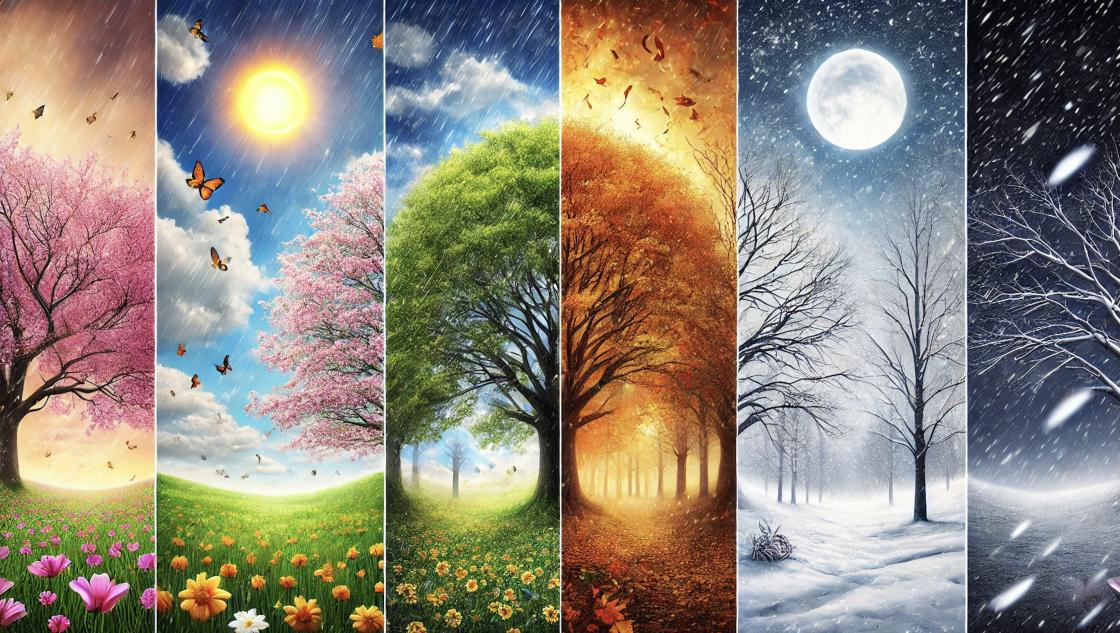In the hustle and bustle of modern life, it often feels like each day is a whirlwind of tasks, obligations, and routines. We check the clock, follow the rules, and structure our lives around systems—systems that, upon closer inspection, are all human creations. Time, money, borders, religion, law, culture: these frameworks shape our daily experiences, dictate our choices, and reinforce societal expectations. But what if we paused to ask a fundamental question: What truly exists beyond these human-made constructs?
Beneath all the complexity of human civilization, a deeper, universal rhythm continues, unchanged and untethered from human perception. It’s the timeless dance of the seasons, the waxing and waning of the moon, the rise and fall of the sun, and the ebb and flow of the weather. These natural cycles are the only constants that preceded human invention—and they will continue long after we’re gone. They remind us that life on Earth is simpler than we think, and by reconnecting with these ancient rhythms, we can free our minds from the illusions of man-made systems.
The Frameworks We Live By: Illusions of Control
From the moment we’re born, we are conditioned to adhere to various systems. Time is divided into seconds, minutes, hours, and years—an endless clock that governs when we wake up, work, eat, and rest. But time, in its clocked and calendar form, is a purely human invention. Our ancestors lived by the rising and setting of the sun, feeling the rhythm of time through the cycles of nature. There were no Mondays or weekends—just day and night, winter and summer.
Take money, for instance: a system we rely on to define worth, success, and survival. But money isn’t an inherent truth of existence—it’s a construct designed to facilitate trade and assign value. A piece of paper, metal coin, or digital number only holds meaning because we collectively agree that it does. Before money, societies thrived on barter, exchange, and sharing resources without the abstraction of currency.
Borders, too, are an arbitrary division. They are invisible lines on a map that separate people by nationality, ethnicity, or legal status. But Earth itself has no borders—these are merely agreements between governments. As a bird flies from one country to another, it is unaffected by human-imposed boundaries.
Similarly, religion, while offering moral guidance and community, is a system built on belief rather than natural law. Throughout history, different faiths have offered varying interpretations of life, death, and the divine. Yet, none of these systems existed before humanity. The sun rises and sets for all creatures, regardless of their beliefs or rituals.
Culture and law, though critical to the organization of societies, are also constructions. Culture provides identity and belonging, while laws establish order and protection. Yet, both are fluid and vary dramatically across the globe. What is legal in one country might be forbidden in another, and cultural practices differ from city to city, reminding us that these systems are contingent and constantly evolving.
The Timeless Truth: Natural Cycles
In contrast, nature offers a truth that transcends human interpretation. Long before we divided our days into hours and set borders around countries, the Earth followed its own cycle—one we are still a part of, even when we forget.
The sun rises in the morning and sets in the evening, governing light and darkness. The moon waxes and wanes in a steady, reliable rhythm, affecting the tides and influencing the natural world. Seasons shift in a predictable pattern—spring bringing growth, summer bearing fruit, autumn signaling harvest, and winter embodying rest. These cycles have been in place for billions of years, and every living organism—plants, animals, humans—exists within this flow.
When we attune ourselves to these natural rhythms, we gain a new perspective on life. The human-made systems that once felt so pressing—money, time, borders—begin to lose their grip on our minds. We start to see that our lives are not meant to be boxed into rigid frameworks but are instead part of a larger, universal flow.
Choosing Your Reality: A Path to Mental Freedom
Recognizing the human-made nature of societal systems doesn’t mean rejecting them entirely. Instead, it invites us to be conscious participants. You can choose how much weight to give these constructs. Do you need to define your worth by money, or can you find fulfillment in experiences, relationships, and personal growth? Must you always adhere to the clock, or can you allow yourself to move in harmony with your natural energy levels? Can you live beyond borders, seeing yourself as a citizen of Earth, part of the broader ecosystem?
By understanding that these systems are constructs, you give yourself the power to decide which ones serve your well-being and which you can let go of. You become freer to shape your own life, guided not by arbitrary societal pressures but by the wisdom of the natural world.
A Universal Perspective: Returning to Simplicity
Imagine for a moment what life would be like if we reconnected with the cycles of the seasons, weather, sun, and moon. Instead of waking to an alarm, you rise with the sun, feeling the warmth of its light energizing your body. As autumn arrives, you slow down, appreciating the harvest and preparing for winter’s rest. In spring, you feel invigorated, ready to grow and create as the earth awakens from its slumber.
By attuning to these rhythms, life takes on a natural order that feels both simpler and more fulfilling. There’s no rush to keep up with artificial deadlines, no pressure to accumulate wealth for the sake of status. Instead, you find contentment in being part of the Earth’s grand cycle—a cycle that is stable, predictable, and enduring.
The moon, too, offers its own wisdom. Its phases remind us that everything in life waxes and wanes. There are times for action and times for reflection, moments of fullness and moments of retreat. By watching the moon’s rhythm, we can learn to honor our own ebb and flow, accepting that we, too, are part of a greater whole.
Living Beyond Constructs
The systems we live by—time, money, borders, religion, culture—are all human inventions, created to organize society and facilitate cooperation. But they are not the ultimate truth. Beneath these systems lies a more profound reality: the cycles of nature. These cycles existed before us and will continue long after we’re gone. They offer us a timeless rhythm to live by—one that is free from the pressures of modern life.
By reconnecting with the natural world, we can liberate ourselves from the confines of human-made constructs. We are not bound by the systems we inherit—we can choose which frameworks to participate in and which to leave behind. In doing so, we open our minds to a more expansive, universal perspective—one that reminds us that we are part of something far greater than ourselves: the infinite dance of the Earth, the sun, the moon, and the stars.
So, take a deep breath. Feel the wind on your skin. Watch the sun rise and set. Let nature remind you of the simplicity and beauty of life, and allow it to guide you to a place of peace, freedom, and universal connection.


